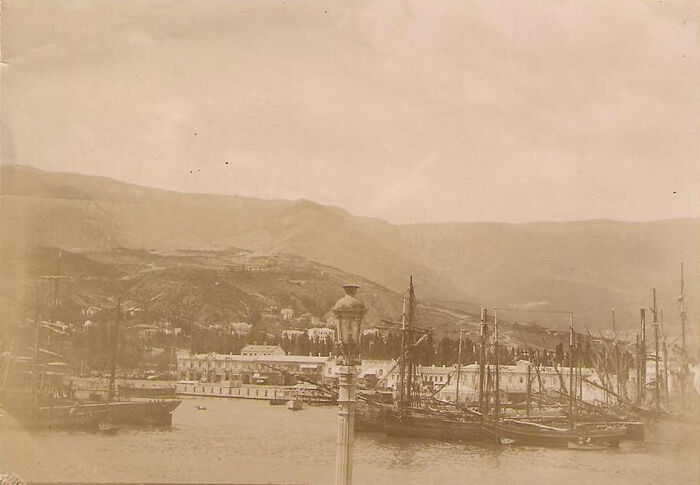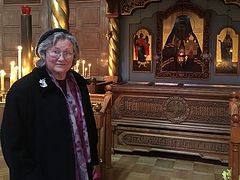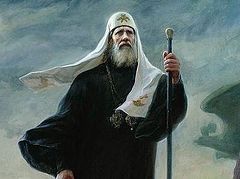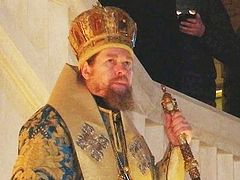“Telling the truth is a petty bourgeois prejudice,
while lying, to the contrary, is often justified by its end.”
Lenin’s words, from the recollections of Yu. P. Annenkov
The devil is a liar, and the father of it.
cf. John 8:44
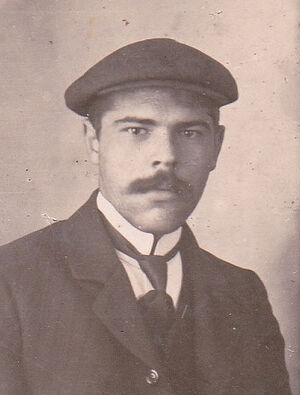 Boris Shishkin In November 1920, a mass of people (military personnel and refugees) accumulated on the Crimean Peninsula. When the Red army was advancing on it, many were faced with the question of whether to flee their Motherland or to stay. On November 11, General Wrangel published an edict announcing the beginning of evacuation. Thus began the Russian exodus…
Boris Shishkin In November 1920, a mass of people (military personnel and refugees) accumulated on the Crimean Peninsula. When the Red army was advancing on it, many were faced with the question of whether to flee their Motherland or to stay. On November 11, General Wrangel published an edict announcing the beginning of evacuation. Thus began the Russian exodus…
It must be said that the majority of those who could not be reconciled with the new regime managed to leave the Crimea. At the same time, many of those who stayed behind were inspired by the sheer scale of change and the “enormity” of plans. It would seem that the time had really come when justice would finally triumph, and all the “enslaved” would be “liberated”. Only in order to attain this “universal justice”, they were supposed to do it “with their own hands”—that is, by decisive action. And if at the beginning few understood what this really meant, with the onset of the era of “militant communism” and the “Red terror”, many reeled in horror at the new regime, realizing that for it, conscience would be replaced by class sensitivity and partisan expedience. Nevertheless, many still had hope that the terrible cruelty of war time would soon be replaced by the prudent temperance of peaceful building. But alas, it did not turn out that way…
Among those who trusted the new government but were later deceived and destroyed was my great uncle, Boris Shishkin. He was a young writer who had returned from the WWI front, far from politics, dreaming of creative work, filled with hopes and plans…
Not long before he was executed on November 6, 1921, Boris managed to write a poem entitled, “To the Wrangelites”. Here is the text:
Like coffins, sarcophagi, the ships,
Packed tightly with rebellious troops,
Across dark waves that leapt and looped,
They sadly rolled and slipped
Across to lands they never missed,
There slowly run ashore. The crowd sails past
The copper sunsets through the mist
To look upon the mooring dead.
The wind kicked up, and there they laughed
Hollow voices from the graves.
As to the eaves,
Orders loudly uttered, fast.
Through palaces the general leads
To the marble tombs of Scutari…1
It’s notable that Boris did not risk writing the poem’s whole name but only indicated it, placing a hyphen between the first and final letters. This was also a sign of the times, when the degree of cruelty and implacability was reaching its peak, and the slightest misstep in conduct or some characteristic trait in clothing and outward appearance, or an incautious word could cost you your life. Apparently, Boris understood this. But he trusted anyway, and stayed… Just like tens of thousands of others who either couldn’t or wouldn’t flee the Motherland, hoping that the new government would be reasonable and humane. After all, many didn’t even fight directly, but were only drawn to one degree or another into the chaos of civil war.
From the text of that poem we can surmise that Boris is sympathetic to the new regime and calls the White army “rebellious troops”. He considers their aims and disposition of spirit to be hopeless and even dead in spirit and prospects. Thus the image of ships like sarcophagi or coffins. And he even calls those who moor at the foreign shores “dead men”… It’s a heavy poem, but Boris characterizes as hopeless (remarkably) not his own situation, but that of those who left the Motherland.
Now it is clear that Boris was mistaken in his assessment of the emigres’ future as hopeless—if only because the Russian emigration played its role in spreading Russian culture and Russian thought throughout the world. But it is also obvious that many of those Russians remaining on the peninsula had a similarly pessimistic view of their compatriots who left their Motherland. It was especially bitter to admit that the majority of them would soon learn what real hopelessness and sacrilege is, not only in the religious but also in the just plain human and moral sense…
Not long before the Red army battalions captured the Crimea, on September 12, 1920, Pravda newspaper published a call to “officers, soldiers, Cossacks, and navy sailors of Wrangel’s army”, stating that all the participants of the White movement who surrendered were promised amnesty.
“Those who honestly and voluntarily come to side of the Soviet authorities,” stated this call, “will not be punished. We guarantee full amnesty to all who come over to the side of the Soviet government.”
Later, on November 12, now under the conditions of the beginning evacuation, the Red army commanders published a new appeal, where among other things it was stated:
“We do not aim for revenge. Whoever lays down their arms will be given the opportunity to redeem their guilt before the people through honest labor.”
And further on:
“We are publishing an edict to the soviet forces about knightly treatment of those enemies who surrender.”
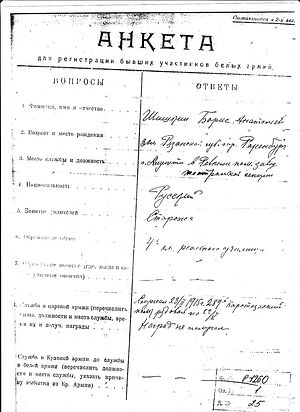 Boris Shishkin’s application Just a few days after the soviet regime took over in the Crimea, when the compulsory registration of all “suspicious elements” was announced, these appeals played their fatal role, because people went to registration centers and openly filled out the forms in hopes of mercy and the promised amnesty.
Boris Shishkin’s application Just a few days after the soviet regime took over in the Crimea, when the compulsory registration of all “suspicious elements” was announced, these appeals played their fatal role, because people went to registration centers and openly filled out the forms in hopes of mercy and the promised amnesty.
But what happened after that not only defies description, but even ordinary human reason. Organized in the Crimea in 1920-21 was real, bloody slaughter.
Murdered were not only officers and soldiers who served in the White army, and not only those who were forced to cooperate with it in one way or another, but a huge swathe of the civilian population that had no direct relationship to the military counterrevolution, from army nurses to those who simply didn’t fit into the new life due to their “class affiliation”. A person could be shot simply because he was a servant of one or another Tsarist Russian agency, was a businessman, a priest, a teacher, etc.
On November 17, 1920, the Crimean Revolutionary Committee published order No. 4 ordering compulsory registration within a three-day period of foreigners, persons who had arrived in the Crimea during the period of the soviet government’s absence, officers, government officials, and soldiers of Wrangel’s army.
Boris also went and registered. His registration form is dated December 11, 1920, on which he open-heartedly and sincerely admits that “in 1920 I served in the White army headquarters in the city of Alusht as a clerk”; moreover he calls himself “sympathetic to the R. C. P.”, that is, the Russian communist party. What was the sense of this “sympathy”, considering Boris was far from politics?
I think that he was set to work and live under the conditions of the “new world”, so to say, “without any stones behind his lapel”, because he basically had nothing to lose in his former life, nothing to cling to. He came from the impoverished nobility. He never received a higher education, partly because his family was too poor. From an early age he had worked physically, and later as a writer. His participation in the First World War had led him to an awareness of the higher values of human life and peaceful coexistence among people and nations. He was also inspired by the hope of doing away with the glaring inequality between the bitter poverty of the “laboring and burdened”, and the idle luxury and self-satisfaction of the “powerful of this world”…
But the new regime had no intention of plummeting the depths of the “alien element’s” psychological disposition, and so the majority of those who came and voluntarily registered were destroyed during the following months, with truly demonic and merciless energy.
As the result of a grandiose deception, approximately (of course no one can establish the exact number) 20 to 120 thousand people, by different reckonings, were murdered in the Crimea in the early 1920s alone—the large discrepancy itself an indication of the monstrous scale and viciousness of the slaughter, the victims being simply impossible to count. It is horrifying to even imagine what must have taken place on the blessed Crimean land, what a terrible and pitiless machine must have turned its wheels in order to carry out this hellish work. But 120,000 is only the number of victims of the Red terror according to the flesh, so to speak; many of them, we hope, redeemed many sins through their sufferings and deaths and acquired the Kingdom of Heaven.
But from the spiritual point of view, it is more frightening for those who signed the death sentences, those who tortured and shot others with diabolical energy and resolve. Those executioners and members of all sorts of “chrezvychaiki”,2 “troiki”,3 and “special departments”… And how many millions of soviet people were then raised in godlessness? Those are the ones we really need to cry about! In this lies the worst crime not only of the new regime, but also of those who prepared the way for its coming: the destruction of countless souls for eternity! A terrible cost for the doubtful happiness of building the “most just society in the world”…
According to the testimony of his family and friends, shaken by the horrors of the Great War and civil strife, Boris dreamed of helping at least a little the most defenseless victims of that adult insanity—the children. He wanted to help them by his creativity and service. He would never realize this dream, but after Boris’s death, his sister, Vera Anatolievna Shishkina, embodied her brother’s plan and went to work in the Yalta children’s home, where she continued working for many years.
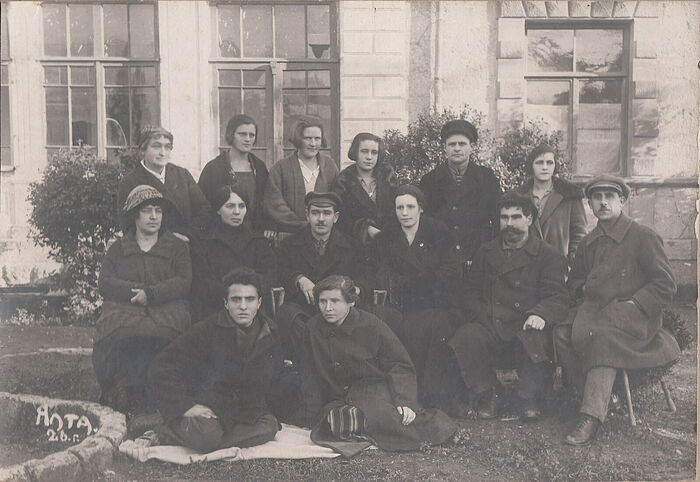 Employees of the Yalta children’s home.
Employees of the Yalta children’s home.
Now many are talking about the need for reconciliation, relatively speaking, between White and Red Russia. A monument is even being built in Sebastapol about this, but the construction work is going very laboriously. The source of such ideas is understandable—the country needs to live on, grow, and build, and this is not possible in an atmosphere of permanent disagreement and smoldering enmity.
But if we can talk about the need to unite the descendants of the Whites and the Reds in building a new nation, then we have to openly admit that the foundation of this new building can only be the Stone “already placed”—that is, Christ. It is Orthodox faith and the strong and multi-faceted Russian culture that grew on its soil. Everything else is a more or less obvious deception.

